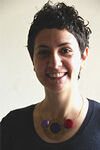Research from Dr Dima Saber and Dr Jerome Turner has informed projects which have equipped over 7,000 activists, journalism students, archivists and human rights advocates with the digital literacy skills to counter misinformation online, and document human rights abuses in the North Africa Western Asia (NAWA) region, in Latin America, East Africa, and the Philippines.
Training the next generation of journalists in the Global South
In the wake of the Arab uprisings in 2011, the NAWA region has been victim to conflict, government-sponsored propaganda, and controls over journalism and its practitioners.
Perpetuated by the mass adoption of social media, fake news has become a dangerous socio-political tool, driving the need for journalists and media activists to have a greater awareness of digital literacy and the tools to challenge propaganda with responsible documentation.
Meedan launched the Check project in 2014, in partnership with BCU. Check is designed around three main interventions: a) the provision of online and offline training supports; b) the establishment of high-impact collaborations between grassroot organisations across the Global South working on issues of shared concern; c) and the development of a public and open-access verification tool, freely available to an extensive network of international partners.
This project began in the NAWA region and has since been implemented in 24 countries.
Research background: Identifying the challenges faced by citizen journalists
Dr Saber and Dr Turner’s research is contributing to improving digital literacy, community-building and political engagement skills for citizen journalists, activists, journalism students, civil society organisations and human rights defenders, thus strengthening their role as investigators and contributors to the public sphere.
Their research has supported journalists and advocates who work in high-risk contexts with digital literacy training and tools to help them safely carry out their work.
Saber and Turner’s work around media coverage has helped identify the various challenges faced by citizen journalists and civil rights advocates in the context of the Global South, and provided a framework for how those challenges can be mitigated through the provision of media literacy training and open access tools.
Outcomes and impact in the North Africa Western Asia region
Improving media literacy skills for journalism students
Through the Check project, the research has contributed to improved literacy skills in five countries across the NAWA region, including Lebanon, Syria, Egypt and Yemen.
More than 2,000 people received training to be more effective citizen journalists and fact checkers in their in-revolution/post-revolution countries. This work was directly influenced by the research, which provided the knowledge to overcome the difficulties in delivering this training in the region.
One example of a successful intervention that helped to identify barriers and improve skills is with the Faculty of Media and Documentation at the Lebanese University, where Saber and Turner helped establish the Nawa Media Newsroom, which has been active since 2017. The newsroom covered a variety of events under the guidance of the BCU team, most significantly, the Lebanese Parliamentary Election of 2018.
The students were trained in electoral law, live reporting, and ethics in live coverage, which enabled the students to cover election day events through short messages, voice notes, videos, photos and stories on the Newsroom's public web page.
Over 100 live-coverage reports and messages were shared from across the country and the students taking part in the newsroom were drawn from the East and West Beirut campuses, overcoming the legacy of division wrought by the Lebanese Civil War.
In 2019, the Newsroom expanded to include students from Syria, Yemen, Egypt and Tunisia.
Enabling and acknowledging the contributions of citizen journalists in the documentation of human rights abuses as part of the Syrian uprising-war
The Syrian Archive is a collective of human rights activists and archivists dedicated to curating visual documentations of human rights violations and other crimes committed during the conflict in Syria.
With the support of the Check project, Mnemonic (which runs the Syrian Archive and Yemeni Archive) trained 1,005 beneficiaries since 2018 to use open-source verification tools, enhancing their skills in documenting war crimes and human rights violations in both Yemen and Syria.
These interventions have expanded the organisation’s base of volunteers and contributors and improved the trainees’ media literacy and archiving skills, so they are better equipped to collect, verify and preserve digital documentations of human rights abuses in their countries.
Building on six years of impactful programming in the NAWA region (2014-2019), the Check Global project (2019-2021) now collaborates with over 20 organisations across the Global South to support emerging practices in online journalism, digital literacy skills, disinformation monitoring, and verification of digital media.


